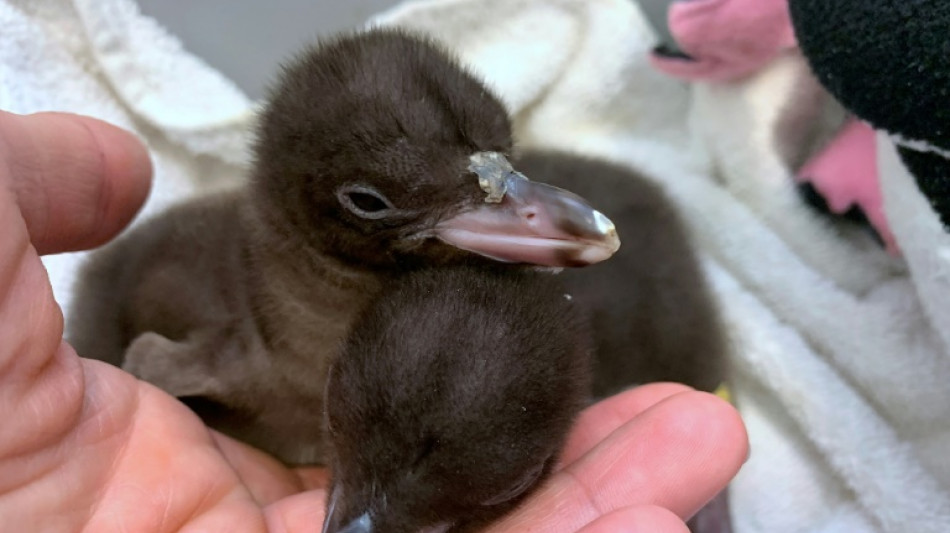
-
 Australia's Green sold for record 252 mn rupees in IPL auction
Australia's Green sold for record 252 mn rupees in IPL auction
-
Elusive December sun leaves Stockholm in the dark

-
 Brendan Rodgers joins Saudi club Al Qadsiah
Brendan Rodgers joins Saudi club Al Qadsiah
-
Thailand says Cambodia must announce ceasefire 'first' to stop fighting

-
 M23 militia says to pull out of key DR Congo city at US's request
M23 militia says to pull out of key DR Congo city at US's request
-
Thousands of glaciers to melt each year by mid-century: study

-
 China to impose anti-dumping duties on EU pork for five years
China to impose anti-dumping duties on EU pork for five years
-
Nepal starts tiger census to track recovery

-
 Economic losses from natural disasters down by a third in 2025: Swiss Re
Economic losses from natural disasters down by a third in 2025: Swiss Re
-
Indonesians reeling from flood devastation plea for global help

-
 Timeline: How the Bondi Beach mass shooting unfolded
Timeline: How the Bondi Beach mass shooting unfolded
-
On the campaign trail in a tug-of-war Myanmar town

-
 Bondi Beach suspect visited Philippines on Indian passport
Bondi Beach suspect visited Philippines on Indian passport
-
Kenyan girls still afflicted by genital mutilation years after ban

-
 Djokovic to warm up for Australian Open in Adelaide
Djokovic to warm up for Australian Open in Adelaide
-
Man bailed for fire protest on track at Hong Kong's richest horse race

-
 Men's ATP tennis to apply extreme heat rule from 2026
Men's ATP tennis to apply extreme heat rule from 2026
-
Cunningham leads Pistons past Celtics, Nuggets outlast Rockets

-
 10-year-old girl, Holocaust survivors among Bondi Beach dead
10-year-old girl, Holocaust survivors among Bondi Beach dead
-
Steelers edge towards NFL playoffs as Dolphins eliminated

-
 Australian PM says 'Islamic State ideology' drove Bondi Beach gunmen
Australian PM says 'Islamic State ideology' drove Bondi Beach gunmen
-
Canada plow-maker can't clear path through Trump tariffs

-
 Bank of Japan expected to hike rates to 30-year high
Bank of Japan expected to hike rates to 30-year high
-
Cunningham leads Pistons past Celtics

-
 Stokes tells England to 'show a bit of dog' in must-win Adelaide Test
Stokes tells England to 'show a bit of dog' in must-win Adelaide Test
-
EU to unveil plan to tackle housing crisis

-
 EU set to scrap 2035 combustion-engine ban in car industry boost
EU set to scrap 2035 combustion-engine ban in car industry boost
-
Australian PM visits Bondi Beach hero in hospital

-
 'Easiest scam in the world': Musicians sound alarm over AI impersonators
'Easiest scam in the world': Musicians sound alarm over AI impersonators
-
'Waiting to die': the dirty business of recycling in Vietnam

-
 Asian markets retreat ahead of US jobs as tech worries weigh
Asian markets retreat ahead of US jobs as tech worries weigh
-
Security beefed up for Ashes Adelaide Test after Bondi shooting

-
 Famed Jerusalem stone still sells despite West Bank economic woes
Famed Jerusalem stone still sells despite West Bank economic woes
-
Trump sues BBC for $10 billion over documentary speech edit

-
 Chile follows Latin American neighbors in lurching right
Chile follows Latin American neighbors in lurching right
-
Will OpenAI be the next tech giant or next Netscape?

-
 Khawaja left out as Australia's Cummins, Lyon back for 3rd Ashes Test
Khawaja left out as Australia's Cummins, Lyon back for 3rd Ashes Test
-
Australia PM says 'Islamic State ideology' drove Bondi Beach shooters

-
 Scheffler wins fourth straight PGA Tour Player of the Year
Scheffler wins fourth straight PGA Tour Player of the Year
-
Tokenwell Plans to Establish U.S. Subsidiary in Dallas, Texas, to Expand its Presence in the Growing Digital Asset Hub

-
 CTT Pharma's Scientists Publish Peer-Reviewed Paper in the Journal of Drug Delivery and Therapeutics
CTT Pharma's Scientists Publish Peer-Reviewed Paper in the Journal of Drug Delivery and Therapeutics
-
Nano One Receives C$10.9M from Financing and Government Programs

-
 WelcomeVille Investment Association With Leadership From Reginald Pembroke Rolls Out a Digital Collaboration Platform
WelcomeVille Investment Association With Leadership From Reginald Pembroke Rolls Out a Digital Collaboration Platform
-
Grande Portage Reports Advancements of Transportation Infrastructure at the New Amalga Gold Project

-
 Genflow Completes Dosing Phase of Canine Gene Therapy Trial
Genflow Completes Dosing Phase of Canine Gene Therapy Trial
-
President Trump Cleaning Up Biden's Marijuana Mess - MMJ Preparing to Move FDA Huntington's Cannabis Trials Forward

-
 Security beefed up for Ashes Test after Bondi shooting
Security beefed up for Ashes Test after Bondi shooting
-
Wembanyama blocking Knicks path in NBA Cup final

-
 Amorim seeks clinical Man Utd after 'crazy' Bournemouth clash
Amorim seeks clinical Man Utd after 'crazy' Bournemouth clash
-
Man Utd blow lead three times in 4-4 Bournemouth thriller


New Zealand probes mystery illness killing rare penguins
A mystery illness is decimating the chicks of New Zealand's endangered yellow-eyed penguins, and scientists say they may have found the cause.
The flightless birds, endemic to New Zealand, stand lower than knee-high, have pale yellow eyes and sport a band of yellow feathers around the head.
There are about 2,400 of the adult birds left, according to estimates by New Zealand's Department of Conservation.
Their status is considered "threatened -- nationally endangered". It is the country's highest risk level.
The mystery respiratory illness first appeared in 20 freshly hatched chicks brought to Dunedin Wildlife Hospital in 2019.
"They were unable to hold their heads up, gasping with glassy eyes," wildlife hospital director Dr. Lisa Argilla told AFP this week.
"It was heart-wrenching to see these little chicks in such critical condition," the veterinarian said.
"All chicks that showed respiratory signs died -- there was nothing we could do to save them."
During the 2020 breeding season, a third of 150 yellow-eyed penguin chicks brought to the hospital died of respiratory problems, Argilla said.
Professor Jemma Geoghegan, an evolutionary virologist, is part of a team of specialists investigating the illness.
"The wildlife hospital tried everything in their power to prevent it but without knowing the cause it's very hard to manage," Geoghegan told AFP.
Scientists tested tissue samples from dead penguin chicks with sequencing technology similar to that used to identify the coronavirus behind Covid-19.
- 'Insane operation' -
"There's two diseases we have been investigating and we have found two viruses which we think are likely responsible," said Geoghegan, a professor at Otago University.
The team had identified a novel gyrovirus and a novel megrivirus, she said.
Between them, the diseases are thought to have killed around 25 percent of yellow-eyed penguin chicks -- roughly 50 each year -- in recent breeding seasons, Geoghegan said.
"We've identified what we think may be the cause and then there's a lot of research needed to potentially work out whether we can prevent or treat the disease," she said.
For now, chicks younger than five days are being taken from their nests to Dunedin Wildlife Hospital, where they can be reared away from the risk of infection.
In 2022, the animal hospital was able to return 90 percent of the chicks to their nests, Argilla said.
"Around 142 chicks were given a second chance," she said.
"If they'd been left in the nest, most of them likely would have succumbed to either disease and died."
The hospital director said it was an "insane operation" to hand-rear dozens of chicks with up to 10 people rostered each day to help with the five daily feeds.
Vets, nurses, zoo keepers and conservation rangers from all over New Zealand came to help, Argilla said.
The flightless birds live in two colonies: a mainland population centred on the southeast of the South Island, and a larger group on New Zealand's remote outer Sub-Antarctic Islands.
Conservationists say the mainland colony's population has declined 75 percent since 2008, leaving only about 200 breeding pairs, which risk disappearing in two decades.
Predators -- such as the long, thin barracouta fish in the ocean, or dogs, cats, ferrets and stoats on land -- along with climate change and infectious diseases have taken a toll.
Argilla said she was hopeful a vaccine would be found to help save the chicks.
"We are only an ambulance at the bottom of the hill doing our bit to save individual birds so that the population decline can hopefully slow down," she said.
O.Johnson--AMWN



